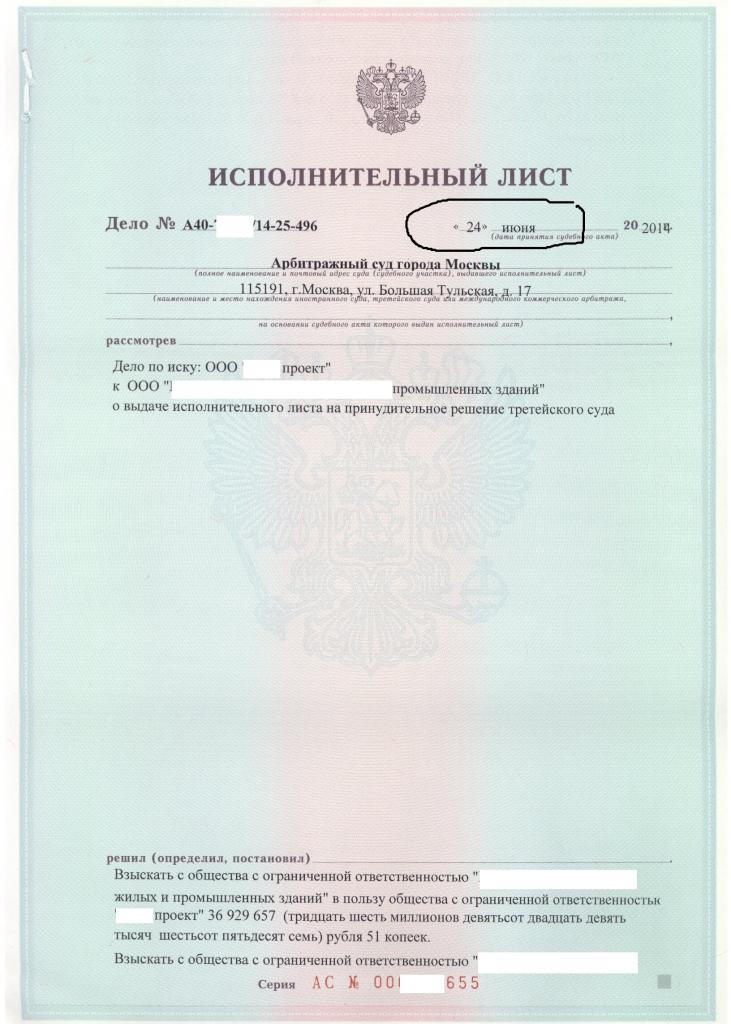A victory won in court is not yet a guarantee that the rights of the plaintiff will be restored. The losing side may not fulfill the requirements prescribed by the court, out of reluctance or because they are not able to do so. Then the plaintiff seeks a writ of execution. After that, bailiffs come into the case, who analyze the situation and take the necessary actions on the enforcement document in a forced manner. In the article, we will talk about the time period for the arbitral tribunal to issue the writ of claim to the plaintiff for his transfer to the bailiff service, as well as other terms associated with this document.

The procedure and period of issue in the general case
To obtain a writ of execution, the plaintiff appeals to the court where the case was examined. The court issues it only after the decision comes into force, that is, in a month. The document should be issued one to two weeks after the corresponding appeal about it. But in fact, he often has to wait much longer.
The reason is that the deadline for the issuance by the arbitration court of the writ of execution (as well as the civil court) is not set. In this regard, clerical workers can delay the issuance of a document for another month. During this time, the debtor has the opportunity to hide or sell his property. When the time comes, it also happens that there is nothing to recover. Such a delay could negate the court decision. Therefore, if the plaintiff had to face a similar situation, he should contact the chairman of the court directly.
In addition, lawyers recommend not only writing an application for the issuance of an executive document, but also periodically request new information about the stage of completion of the sheet.
The plaintiff will not have to wait long for the recovery of alimony or salary debt that has not been paid for three or more months. In this case, the executive document must be issued immediately after the adoption of the court decision. In addition, it is subject to urgent execution. This means that you do not have to wait for the usual deadlines until the decision comes into force, but transfer the list to the bailiffs immediately. These specialists also initiate proceedings urgently, and not within 3 days, as is the case in the standard procedure. This is stated in articles 211 and 428 of the Code of Civil Procedure.

Art. 319 agribusiness of the Russian Federation
This article of the Code of Arbitration provides for the procedure for the issuance of writ of execution by the arbitral tribunal directly. We study the main provisions of this process.
The document is issued by the same court that considered the case and made the appropriate decision. The issuance of a duplicate writ of execution by the arbitral tribunal is carried out in a similar manner. The order is issued on the basis of the norms specified in Chapter 29.1 of the APC of the Russian Federation.
In order to receive the document, an application for the issuance of a writ of execution is filed with the arbitration court. It is issued directly to the applicant or sent to the authority where he will be executed. If the matter concerns the recovery of budget income, the document is sent to the tax authority or other authorized state authority at the location of the debtor.In the case of a case for compensation for violation of rights to judicial proceedings or the enforcement of a court act, a sheet is sent to the executive body within 5 days, regardless of whether the plaintiff filed a statement or not.
The document can be sent in electronic format with the electronic signature of the judge in the prescribed manner. In general, one document is issued. But in some cases, a larger number may be provided. This may occur when there are several plaintiffs and / or several defendants, or when executed in different places. One way or another, regardless of the time period for the arbitral tribunal to issue the writ of execution, the latter only takes effect after the entry into force of the court decision. Exceptions are cases when a decision is made urgently.

General presentation of a document
The period of time during which a writ of execution can be transferred to the appropriate structures is a limitation period. Upon its expiration, the document becomes null and void. This means that it will no longer be possible to institute proceedings against him and present as a legal basis for collecting debt from the defendant. For most of these documents, this period is 3 years. Moreover, it begins to be calculated not from the moment the arbitration court issues the writ of execution, or the last meeting, but from the day the court decision comes into force. This is stated in Article 21 of the Law on Enforcement Proceedings No. 229-FZ.
Presentation of a document in special cases
Exceptions include the following cases:
- Documents on the payment of alimony and other payments, which are periodic in nature, are valid not only during the entire collection period, but also 3 years after the expiration of this period. Thus, if payments were made in favor of a minor child, then a writ of execution may be presented before they are 21 years old.
- If, for example, the Moscow Arbitration Court has restored the statute of limitations on the writ of execution, which was to be presented within 3 months, then with repeated omission, restoration will become impossible.
- Documents on administrative offenses are valid for two years, and on the return of a child taken out of the country illegally - within one year.

Refund and re-calculation
The law provides for cases in which the limitation period is interrupted, and then begins to flow again. This is stated in Article 22 of Law No. 229-FZ. These situations include the following:
- The recoverer appealed to the bailiffs about the opening of enforcement proceedings.
- The defendant began to repay the debt. If the receipt of funds ceases, the period will resume.
- The bailiff returned the writ of execution to the claimant, as he considered that it was not possible to execute the court decision. For example, the debtor does not have property, as well as money, or his location is unknown. If the enforcement proceedings are closed by the bailiff, this does not mean that the relevant document cannot be presented again in the future. After six months, the plaintiff may again contact the bailiff service to re-open the enforcement case.
- Another situation in which the deadline for the execution of a decision of an arbitration court (or civil) is suspended is the provision by the court of installments or deferrals. When the corresponding period ends, the calculation of the executive document will resume.
If the deadline is missed
There are cases in which the claimant did not apply for recovery on time for good reason. Then he can restore the limitation. Such a right is given to him on the basis of Article.432 Code of Civil Procedure of the Russian Federation. To this end, the plaintiff appeals to the court with an appropriate statement, and presents evidence of the reasons.
The court will notify the parties of the meeting. However, they are not required to appear, as the application can be considered in their absence. The problem may be that the law does not establish specific reasons that can be considered valid. This means that the court proceeds from an objective analysis of the case and can make different decisions depending on the circumstances. One way or another, a complaint may be filed against a decision made by a court.

Deadlines for bailiffs
After receiving the writ of execution in the arbitration court, the plaintiff transfers it to the bailiffs, who are obliged to carry out measures for the enforcement of debt collection from the debtor. According to Law No. 229-FZ, this is given 2 months. Sometimes the period for the execution of actions by bailiffs is established by the court or other laws. Then, a note is made about this in the writ of execution, and the bailiff must take the necessary steps in this direction for a specified period of time.
If the document indicates immediate execution, then actions should begin the very next day after the receipt of documents by the bailiffs. Enforcement claims must be executed on the day they are received.
These periods do not include the following periods:
- When the actions were not committed due to the delay of the bailiff or at the request of the applicant.
- Suspension of the case.
- The court gave the debtor an installment plan or a deferment.
- One of the parties appealed to the court to clarify the essence of the document, either asked for a delay or installment plan, or the order of executive actions had changed.
Interruption and termination of enforcement proceedings
The period is interrupted, starting from the day of appeal, and resumes after the adoption of the relevant decision. For example, if the Moscow Arbitration Court decided to involve an appraiser in the case, then the period is suspended from the day the decision on this is issued, and is restored after the expert opinion has been prepared. If the property is transferred for sale, then the stop begins on the day the property is transferred, and resumes - on the day the funds are credited to the account.

If the period prescribed by law has expired, and the result has not been obtained, then this does not serve as a basis for the completion of production. The closure of enforcement proceedings is indicated in Article 47 of Law No. 229-FZ. This is done if the debtor:
- Fulfilled the obligations of the court.
- Is bankrupt.
- Does not have property or money that may be enforced.
Suspension period
Enforcement proceedings may be suspended by either the court or the bailiff. The corresponding period depends on the reasons for which this happens, and is indicated in Articles 39 and 40 of Law No. 229-FZ. As soon as circumstances are resolved, the proceedings resume.
For example, if the defendant is treated in a hospital or undergoes military service, then the bailiff may suspend the case. Then it will resume after the recovery of the patient or the demobilization of the military.
Features of the support document on child support
The longest deadlines are provided for child support. A writ of execution on them is allowed to be submitted during the entire period when payments are due, and also within three years after this deadline. So, if alimony is assigned in favor of a minor child, then a writ of execution can be submitted before the age of 21. For older parents, child support is paid for life.
These writ of execution must be executed immediately. Therefore, the relevant writ of execution is issued immediately after the trial. And when the document goes to the bailiff service, enforcement proceedings should be started within 24 hours.

Conclusion
Article 319 of the APC of the Russian Federation contains the main provisions on the basis of which the execution of the executive document is carried out. However, for a complete understanding, it is necessary to study the articles of the Law on Enforcement Proceedings No. 229-FZ. Then a more complete picture is formed of how the process as a whole takes on other individual points, for example, which arbitration court issues a writ of execution.
